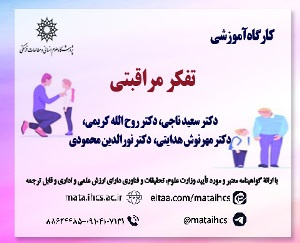مطالعه تجربه زیسته دختران در زمینه سازگاری با فوت مادر در دوران نوجوانی (مقاله علمی وزارت علوم)
درجه علمی: نشریه علمی (وزارت علوم)
آرشیو
چکیده
سوگ مادر در در دوران نوجوانی، اثرات گسترده ای بر نوجوان می گذارد. با توجه به اهمیت موضوع؛ پژوهش حاضر با هدف مطالعه تجارب زیسته دختران جوان در زمینه سازگاری بعد از فوت مادر در دوران نوجوانی انجام شده است. این پژوهش با رویکرد کیفی و به روش پدیدارشناسی انجام شده است. جامعه مورد پژوهش دختران نوجوان و جوان سن 20 تا 30 سال هستند که مادر خود را در دوران نوجوانی از دست داده اند. مشارکت کنندگان به صورت در دسترس از طریق فضای مجازی انتخاب شدند. روش گردآوری اطلاعات مصاحبه نیمه ساختار یافته بود. از کدگذاری اطلاعات به دست آمده بعد از تحلیل داده ها 22 مضمون فرعی استخراج شد که در 6 مؤلفه اصلی قرار گرفتند. یافته ها نشان داد تغییر نگرش، پذیرش حمایت های جایگزین، تلاش هدفمند و پرورش روابط صمیمانه بعد از تجربه فقدان به سازگاری با زندگی پس از فقدان می انجامد. شیوه های سازگاری غیرمؤثر شامل طیفی از توجه برگردانی تا عدم مواجه با مسئولیت زندگی می شود که حالت اخیر، به سرکوبی فشار روانی ادراک شده و احتمال تداوم اثرات آن می انجامد.Studying the lived experience of girls in the field of adapting to the death of their mother during adolescence
The loss of a mother during adolescence has a profound impact on the adolescent. Recognizing the significance of this subject, the present study aimed to explore the lived experiences of young girls in the realm of adaptation after the death of their mothers during adolescence.Methodology: This research employed a qualitative approach and a phenomenological method. The research population comprised teenage girls and young women aged 20 to 30 who had lost their mothers during their teenage years. Participants were selected through virtual platforms, and data collection was carried out via semi-structured interviews.Findings: After analyzing the data, 22 subthemes were identified and categorized into 6 main components. The results indicated that shifts in attitudes, acceptance of alternative support systems, purposeful efforts, and the cultivation of intimate relationships post-loss contribute to adaptation to life after such a significant loss. Ineffective coping methods encompass a spectrum ranging from diverting attention to avoiding the responsibilities of life. The latter state may lead to the suppression of perceived psychological pressure and the potential continuation of its effects. Keywords Grief, Adolescent, Mother, Adaptability, Girls IntroductionAdolescence is one of the most active and challenging stages in a family's life, especially for girls, given the unique emotional, physical, and cultural conditions, and the pivotal role of the mother as the closest emotional figure to her daughter. Engaging in open conversations with a teenage daughter about the physical and mental changes, problems, and challenges of this period can help her navigate this phase with minimal anxiety. Recognizing the importance of the mother's presence during this time, one of the most significant shocks that may occur is the loss of a mother, which can have far-reaching effects on a teenage girl. If the teenager receives support during this crisis and can adapt to the loss of her mother, her growth and development will be enhanced.MethodologyThe present study employed the phenomenological method to investigate the lived experiences of young girls in adapting to the death of their mothers. The research targeted teenage girls and young women aged 20 to 30 who lost their mothers during adolescence. Sample members were selected as available through virtual platforms, and semi-structured interviews were conducted. The participants were asked questions about their adaptation after the death of their mothers, such as recounting memories and describing how they coped with the loss.The interviews continued until data saturation, with a total of 12 participants included in the sample. Following the interviews, the participants' statements were coded and analyzed. The analysis of the research question resulted in 22 sub-codes and 6 main codes. The 7-step Claysey method was utilized for data analysis.FindingsAfter a thorough examination and coding of the interviews, 22 sub-themes were identified within the framework of "investigating the lived experiences of girls in the field of adaptation after the death of their mother," which were categorized into 6 main components. A shift in attitude, acceptance of alternative support systems, purposeful effort, and the cultivation of intimate relationships after experiencing loss contribute to adaptation to life after the loss.Ineffective adaptation methods encompass a spectrum, ranging from diverting attention to avoiding the responsibilities of life. The latter state may lead to the suppression of perceived psychological stress and the potential continuation of its effects. ResultThe present research utilized the phenomenological method to explore the lived experiences of young girls in adapting to the death of their mothers during adolescence. In the realm of mourning and its consequences, numerous studies have been conducted. The findings of this study align with those of Hogan and Schmidt (2002), Vanderhaven (2002), Sadeghinia (2015), Seward (1997), Lotfi (2016), Mota (2021), Pederson (2019), Samoel (2018), and Abramz (2019).One of the strategies aiding young girls in adapting after the death of their mothers involves the individual's perspective and approach to understanding the loss and accepting their new role. A significant part of people's adaptation to bereavement stems from accepting emotional support from relatives without perceiving it as pity. Additionally, active participation in events with the deceased mother's friends and discussing the mother's bereavement with family members have significantly contributed to adapting to the loss.Adolescent girls who establish sincere and emotional connections with friends, parents, and close relatives and accept their spiritual, social, and emotional support tend to adapt to new conditions to a great extent. Another factor influencing girls' adaptation is prayer and talking to God, which has provided peace for some participants. Some participants have employed passive strategies for adapting to new conditions, such as relying on others to alleviate loneliness, distancing themselves emotionally to foster growth and strength, dreaming about personal strength, and utilizing tranquilizers and engaging with the opposite sex.







